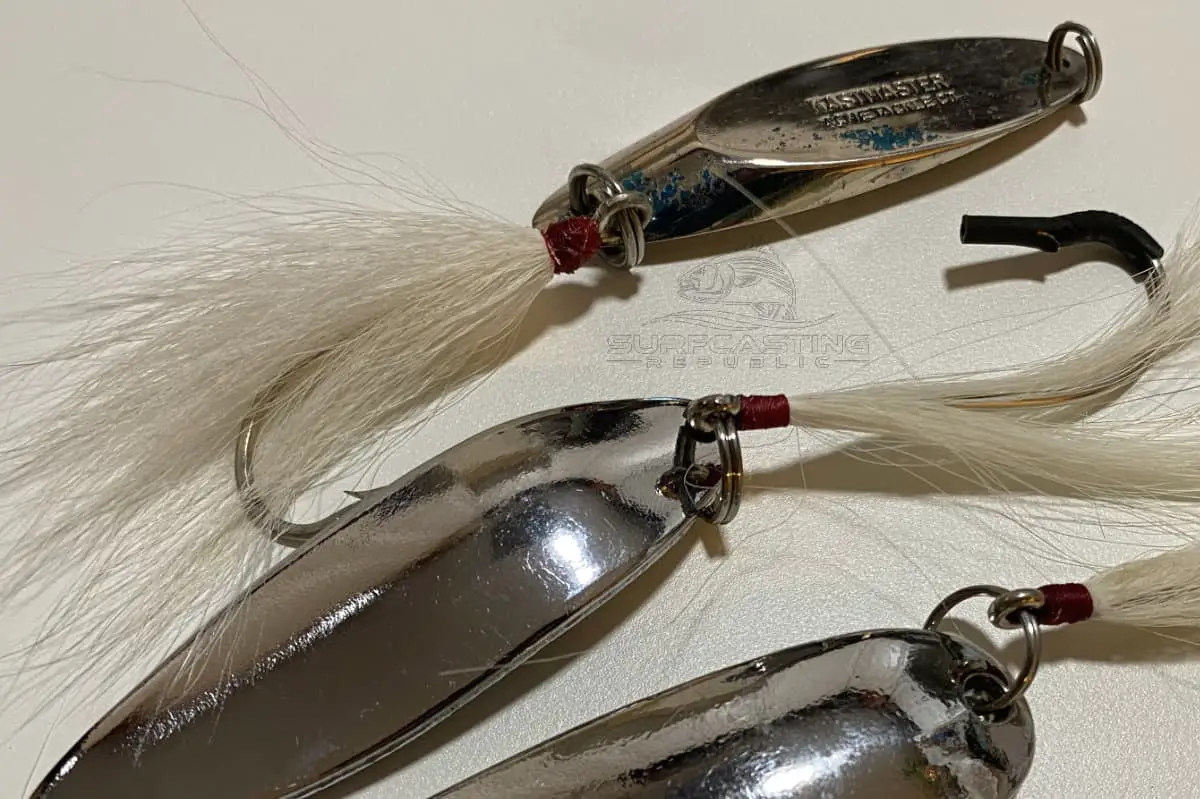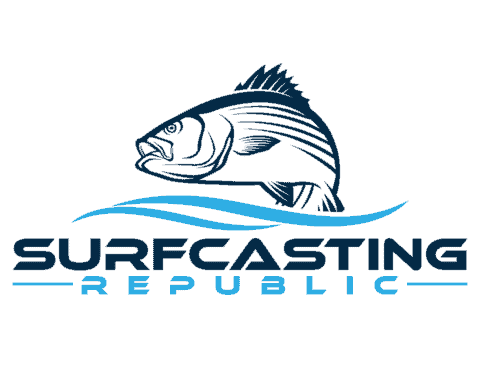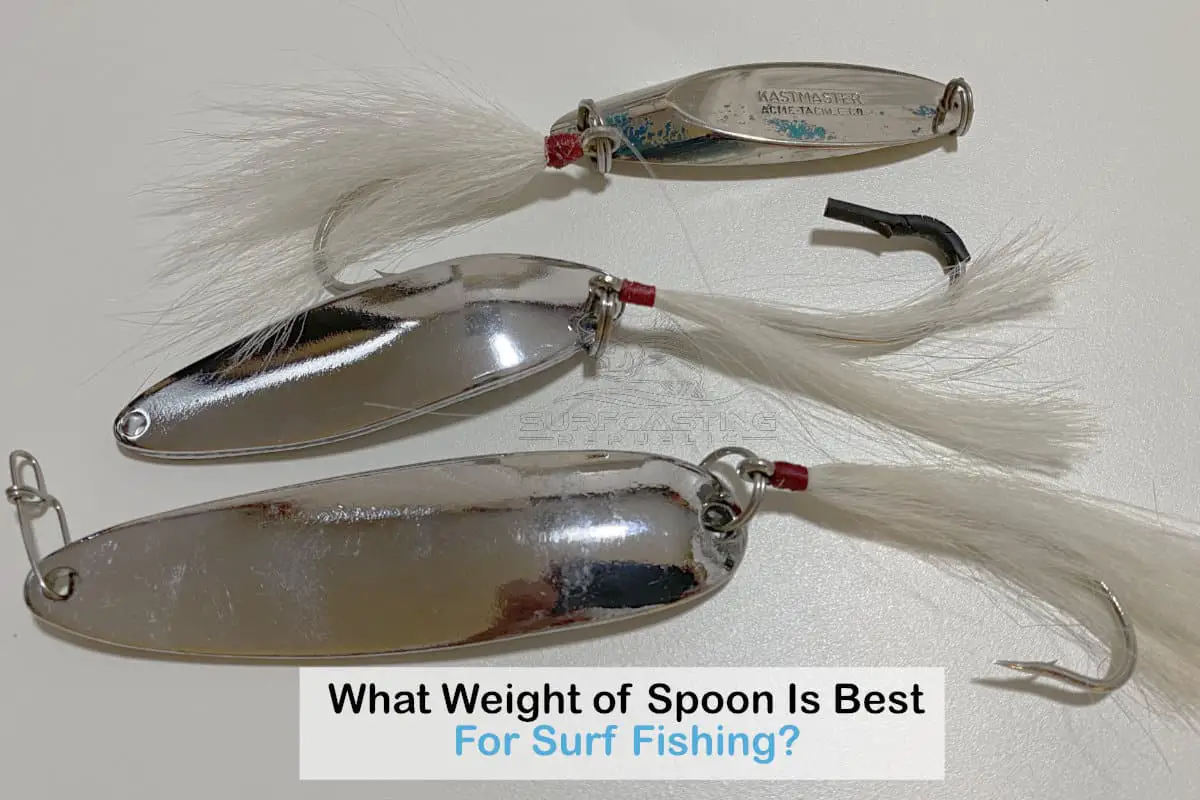Spoons are flat and shiny metal lures used to attract the attention of a fish by mimicking the movement and look of a smaller fish or prey. The shape of the spoon allows it to wobble in the water to re-create a swimming movement while the metal reflects the light, creating the illusion of potential prey.
They are great lures to use for surf fishing, and more often than not, result in a catch. Spoons come in so many colors, shapes, and sizes (weights); the selection is almost endless! Your choice will, however, be influenced by the type of fish you are targeting, and how far off the shore these fish are.
So what weight of spoon works best for surf fishing?
The weight of the spoon determines how much the lure moves in the water and also how deep it will sink in the water, which all affects the success of your catch. Generally speaking, a 2 oz spoon will do the trick in most situations, especially for medium to small predators that like to chase down their prey.
It is, however, always a great idea to carry some smaller spoons of 1 oz or even ½ oz for some of the smaller faster predators. These smaller lures will mimic an injured prey and will be irresistible to a predator on the hunt.
Besides the weight of the spoon, there are many other factors to consider when using metal lures in surf fishing.
The type of spoon, the spoon color, and the target fish species and their behavior will all affect your choice – so let’s have a look at these in detail.
Advantages of using spoons
Metal lures are often neglected in surf fishing for the use of newer and more popular plastic, epoxy or rubber counterparts. There are, however, some distinct advantages to using metal spoons.
Firstly, they are versatile and very easy to use. You can almost never go wrong by casting a spoon in the surf, plus they are so easy to cast in any wind speed and direction.
Secondly, they come is such a large variety of shapes, sizes, and colors, catering to your every fishing need.
Lastly, they are inexpensive, strong, and widely available, and no matter how sharp the fish’s teeth or how many times they hit the rocks, spoons always come back in one piece.
The fact is, for the fishermen that use them regularly, they are indispensable.
Disadvantages of spoons
No lure is perfect, and metal spoons do have some drawbacks. The most notable of these is the fact that they can easily twist your line if they spin to fast.
They also tend to create knots and tangles in some cases that will have to be removed before you can cast again properly.
Since spoons are metal, they will all rust in some way or another after long exposure to moist salty conditions.
Luckily the rust can easily be removed with steel wool, and the spoon can then be painted and varnished for re-use.
If you are not up to scouring and painting, you can always opt to buy more spoons since they are so cheap and readily available.
Types of spoons

Saltwater lures should be suited for the corrosive action of the sand, waves, and salt in the water.
Acme is a popular choice for most surf fishers, and favorites include the:
- Acme Little Cleo,
- Luhr Jensen Krocodile,
- or the Acme Kastmaster.
Spoon weight
The weight of the spoon will mainly influence three things, namely:
- Casting, including the length of your cast. Heavier lures help you cast farther and are less susceptible to wind speed or direction.
- The movement of the lure, as heavier lures will swivel slowly, while lighter spoons will swivel fast. If a spoon swivels too fast, it can twist your line and even tangle it is some cases. Heavier lures are also more resistant to being pulled by currents.
- The depth of your cast. Heavier lures will sink faster and deeper than light lures. This will affect which fish species you target, as fish species hunt in different ways and at different depths.
Spoon color
There is a lot of debate about what color is best for what circumstances, but in general, if you are fishing in the ocean on a clear, sunny day, a lure with a lighter color will come off best.
When fishing in clear water, it’s a good idea to choose a lure of similar color to your intended catch.
Night fishing requires a different approach, and some anglers use colored spoons such as a white crocodile spoon, while others prefer a black spoon on very dark nights.
Many anglers also prefer to modify their lures to suit their specific needs, and this is usually based on experience.
The clarity of the water and the amount of light available on a given night will affect how fish respond to each lure.
Sometimes just giving the spoons a coat of glossy enamel can have a luminous effect that attracts the fish.
Is the Weight of the Spoon Important for Successful Surf Fishing?
When it comes to successful surf fishing, the best size weight for surf fishing can make a big difference. The weight of the spoon can affect how far you can cast it and how well it sinks to reach the fish. Choosing the right weight is essential for a productive fishing experience.
Target species
Each fish species has a particular preference when it comes to a hunt. How they hunt, what they hunt, and the size of their prey all play a part in their choice, and this will affect the type of lure – in this case, the type of spoon you use.
Let have a look at some examples:
- Spanish mackerel. These are smaller predators that are very fast and are likely to chase down their prey from behind. A ½ to 1 ½ oz spoon will most likely do the trick as these mimic the movement of a small wounded fish – the mackerel’s favorite prey. You may also have to add a metal leader to your line as these mackerel have very sharp teeth that can easily cut through monofilament or fluorocarbon line.
- Bluefish. Bluefish are similar to mackerel in that they are fast hunters that go after fast-spinning lures. They are, however, a bit larger than mackerel, and a larger spoon of about 1-2oz will do the trick. During the low tide, they will be a father out, so you will have to cast further, while during high tide, they can be as close as 30ft from the shore. Simply cast into the group and reel in quickly to create that movement they like.
- Snook. Snook is more of an ambush predator than mackerel and bluefish, so casting from peers, rocks, or a small inlet is a good idea. Since they are ambush predators, they are not likely to chase down a fast lure – so choose a slower reel in. A spoon size of ½ to 1oz will do.
- Tarpon. Although these fish can get quite large, they will not necessarily need a larger lure to bite. Fishermen have pulled out 6ft tarpons with relatively small spoons. Big fish will eat little fish if there are lots of little fish around, so if minnows and anchovies are swimming about, you can get very lucky with a small lure. Target them during high tide in the early morning or late afternoon – as the low light and tide conditions can trick them to taking your bait.
- Striped bass. Striped bass is one of many angler’s favorite fish to catch when surf fishing. Many anglers are successful in using a spoon to catch this fish. Depending on the current, you can try to use 1-oz to 2-oz or even heavier if you prefer. Having different sizes is always a great idea so that you can always adjust to meet your needs.
Summary
To conclude, using metal spoons in surf fishing is a must. If you have not tried them yet, get yourself a selection of weights and colors and test them out – I am sure they will be worth your time in the catch!

